Trauma-Informed Church Offers Ministry Like Jesus Would
May 24, 2023 | by NBA Cares
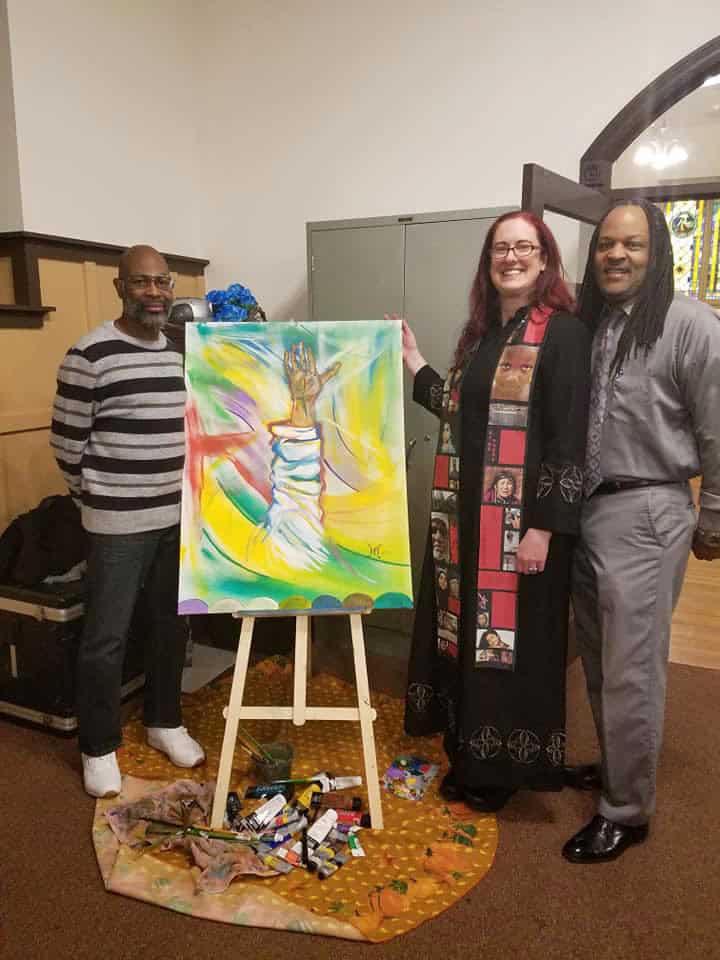
When Rev. Amie Vanderford and Thaddeus Shelton Jr., MFT, CSAYC, spent most of 2019 envisioning and crafting a plan to bring a new trauma-informed church to Indianapolis, Indiana, they had no idea that by the time it launched in 2020, a global pandemic would force them to pivot.
“I always say that God has quite a sense of humor. From calling me into ministry to having us be inspired to create a trauma-informed church before a massive global trauma,” Vanderford says. “So, we had two in-person meetings, then in March of 2020, we immediately went online.”
Despite the unexpected shift, Vanderford and Shelton were committed to bringing relational healing to their community, so they continued their church model, and The LabOratory Church was born. Three years later, their ministry has grown into a community garden, a mentorship space for children and young adults, and a spiritual community for people of faith seeking healing.
The Trauma-Informed Approach
The LabOratory Church was founded as a place where people can gather and experience relational healing through compassion, grace, accountability, and restorative justice. As founders, Vanderford and Shelton both acknowledge that not every religious space has served as a place of healing and community, thus their church model is designed with this in mind.
“We realized the church has the biggest opportunity to provide brave spaces where folks can be authentic, build trust with others, and do relational healing without feeling condemned. So, if you’re a person who has experienced trauma, we still suggest individual therapy and doing internal work, however, we feel the church specifically can offer the space to build trust and deeper authentic relationships with one another, which then leads to relational healing,” Vanderford explains. “We can create safer spaces where people can be vulnerable, authentic, tell the truth, have conflict, including facing accountability when harm is caused to one another, and eventually, find resolutions and relationship repair.”
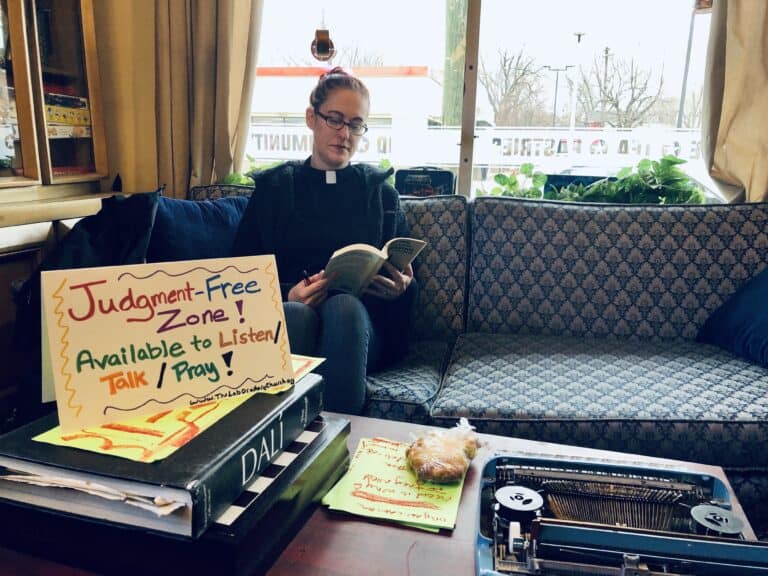
The LabOratory creates space for relational healing in a variety of ways, but has a strong guiding principle: What would Jesus do? This question is at the forefront of their minds when ideas for new ministries or ways to engage with their congregants come up. It’s a question that has birthed a community garden for food insecure zip codes in Indianapolis, a mobile pantry and food delivery service and a mentorship program for historically disenfranchised youth.
“We like to think of our work as a robust way of doing church because our church is taken to the person instead of people having to come to the church,” Shelton says. He goes on to say it’s about intentional relationship building and acknowledging that there don’t have to be many people for the work to be powerful. “When it comes to being trauma-informed, our focus is on creating safety first and addressing human needs, just like Jesus did. We went back to basics.”
Ministering to the Community
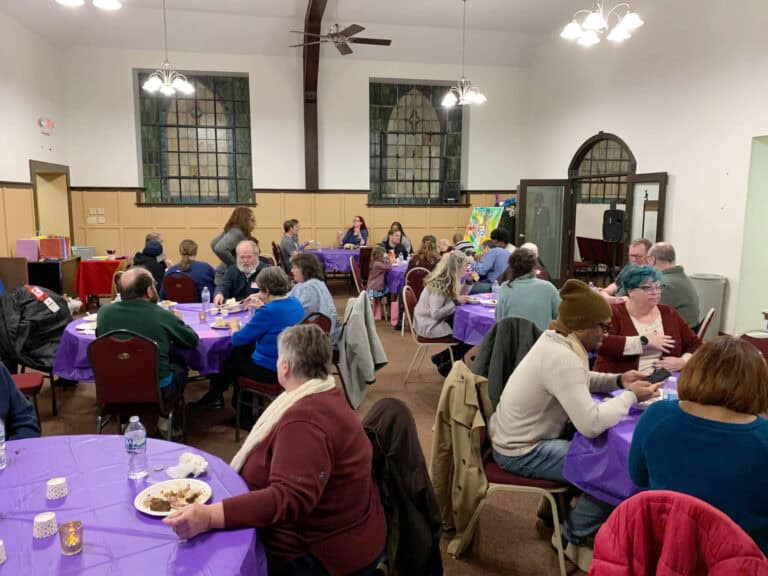
Founded in 2018, Project LEAST (Love Everyone As Self Training) was created as a mentoring program to teach prosocial skills to youth in underserved communities. The program, which was founded by Shelton, has a vision that is focused on addressing the negative effects of systemic racism, and economic disparities, and teaching people how to be in healthy community with one another for the good of the larger community and those within it. The ministry serves young people aged 10–24 and addresses these barriers by helping them get reoriented with healthy relationships in their community. This program was part of the inspiration for the work they do under the church and thus became a part of the church upon its founding. Vanderford and Shelton joined the 2021 NBA Social Entrepreneur Cohort to help develop and grow Project LEAST.
“Project LEAST came from the philosophy of learning how to love oneself in a healthy way to then learn to love others in a healthy way. I wanted to teach the concept of communal support and building relational bonds amongst young people, and really, people of all ages,” Shelton explains. “Our culture can be like The Hunger Games sometimes, but folks who are feeling alone and cast out need each other, and this project lets people know they aren’t alone.”
The project specifically provides support and education about resources and interpersonal skills to those who may not have supportive family and/or community structures. Participants in the program learn healthy coping and communication skills, how to be vulnerable, and provides emotional and social outlets other than competitive sports. Youth in neighborhoods across the city, including youth who have been in the juvenile justice system, have benefitted from this program.
In addition to its mentorship ministry, The LabOratory has two ways their Marion County neighbors can get access to fresh, locally grown fruits and vegetables, The Garden Lab and 4KEEPS Mobile Food Pantry. The Garden Lab refers to the community garden the couple started in 2018 as a component of the original Project LEAST program. The first iteration of the garden had three small beds with tomatoes, peppers, and cucumbers.
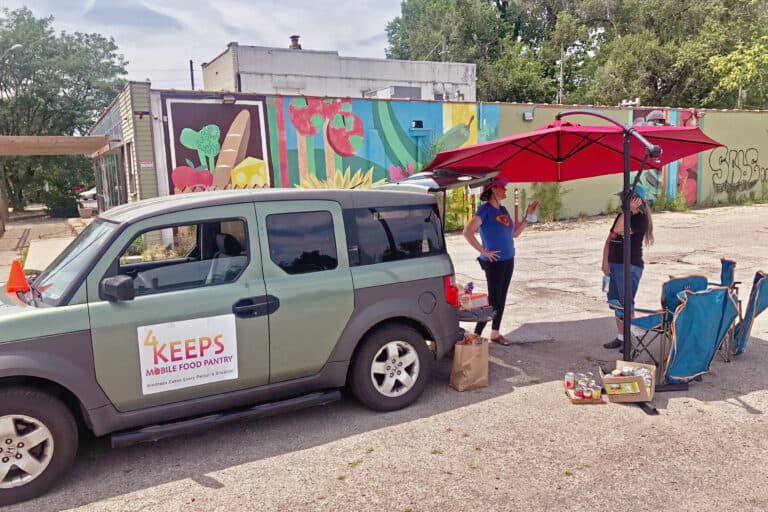
Five years later, the garden has called several lots home and now occupies the couple’s backyard in their eastside Indianapolis home. Over the years, they’ve tried different types of gardening, and this year they added a new component of growing microgreens indoors to show others in the community it’s possible to grow their own food even without abundant land or ideal conditions. Today, the garden yields more than a dozen crops including many types of greens, carrots, potatoes, peas, tomatoes, peppers, and eggplants. They share their food with neighbors, the youth they work with through Project LEAST, and their 4KEEPS Mobile Pantry service that shares fresh produce with households on the near east side of Indianapolis, neighborhoods that have historically lacked access to fresh, healthy food options.
4KEEPS Mobile Food Pantry was born directly from the community. Vanderford and Shelton kept receiving requests for food from their garden, or places to get fresh produce when they realized with a little help from their neighborhood, they could provide the fresh food themselves. They put out a call for donations and a vehicle that had the capacity to handle deliveries. They also applied for an NBA COVID Response Grant which helped them fix up a donated SUV and purchase supplies to make their goal of bringing fresh food to food-insecure neighborhoods, a reality.
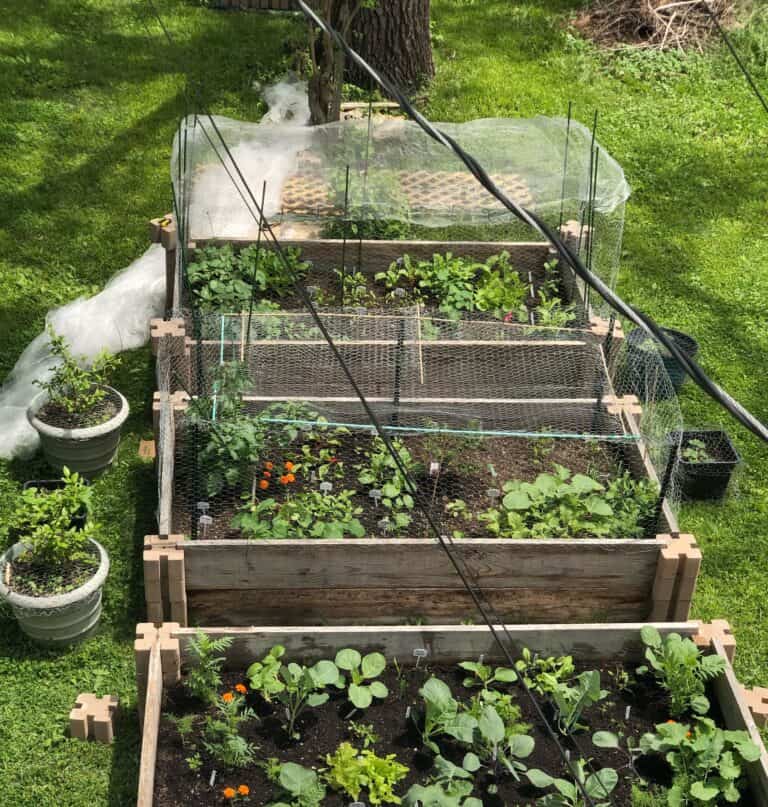
“For us, it goes back to the fact that Jesus always fed people. We provided meals the first two times we met as a congregation, prior to the pandemic. We always wanted our work to be associated with physical, as well as spiritual, emotional, and relational needs.” Vanderford explains. “We live in a food desert, produce is expensive, and we believe in the spiritual concept of harvest. Our garden shows that you can grow your own food without supporting corrupt systems. Food is medicine and we believe if we’re the church, we should be feeding, healing, and teaching like Jesus. It’s all connected.”
Bold Visions for the Future
After five years in ministry through The LabOratory Church and the projects housed within it, Vanderford and Shelton are encouraged by the virtual and in-person community they’ve built and served. Yet, they have plans for so much more. When asked what is next for their ministry and the bold visions they were dreaming up, they shared their dream of owning a farm and brave community space for their city.
“We’ve been doing things online, going with the flow and working with what is in front of us, but our bold vision for the future is a farm. We want at least five acres of land, where we can heal the soil, grow food, have tiny homes for people to have shelter, and so much more.” Vanderford muses. “We want to explore multiple sustainable farming methods for growing food and raising animals, as well as build a commercial kitchen/meeting space so people can learn how to cook the food that’s grown, while also learning about mental health and entrepreneurship opportunities. Overall, we want to create a space where people can grow in community and a place that creates an infrastructure of care.”
Learn more about The LabOratory Church at TheLabOratoryChurch.org or attend one of their virtual services on their YouTube channel @TheLabOratoryChurch.
